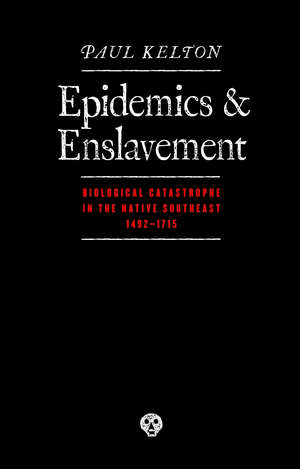Epidemics and Enslavement: Biological Catastrophe in the Native Southeast, 1492-1715: Indians of the Southeast
Autor Paul Keltonen Limba Engleză Paperback – 30 iun 2009
Epidemics and Enslavement is a groundbreaking examination of the relationship between the Indian slave trade and the spread of Old World diseases in the colonial southeastern United States. Paul Kelton scrupulously traces the pathology of early European encounters with Native peoples of the Southeast and concludes that, while indigenous peoples suffered from an array of ailments before contact, Natives had their most significant experience with new germs long after initial contacts in the sixteenth century. In fact, Kelton places the first region-wide epidemic of smallpox in the 1690s and attributes its spread to the Indian slave trade.
From 1696 to 1700, Native communities from the Atlantic Coast to the Mississippi Valley suffered catastrophic death tolls because of smallpox. The other diseases that then followed in smallpox’s wake devastated the indigenous societies. Kelton found, however, that such biological catastrophes did not occur simply because the region’s Natives lacked immunity. Over the last half of the seventeenth century, the colonies of Virginia and South Carolina had integrated the Southeast into a larger Atlantic world that carried an unprecedented volume of people, goods, and ultimately germs into indigenous villages. Kelton shows that English commerce in Native slaves in particular facilitated the spread of smallpox and made indigenous peoples especially susceptible to infection and mortality as intense violence forced malnourished refugees to huddle in germ-ridden, compact settlements. By 1715 the Native population had plummeted, causing a collapse in the very trade that had facilitated such massive depopulation.
Din seria Indians of the Southeast
-
 Preț: 217.90 lei
Preț: 217.90 lei -
 Preț: 212.73 lei
Preț: 212.73 lei -
 Preț: 406.96 lei
Preț: 406.96 lei -
 Preț: 305.55 lei
Preț: 305.55 lei - 18%
 Preț: 763.91 lei
Preț: 763.91 lei -
 Preț: 102.69 lei
Preț: 102.69 lei -
 Preț: 255.82 lei
Preț: 255.82 lei -
 Preț: 124.75 lei
Preț: 124.75 lei - 18%
 Preț: 900.84 lei
Preț: 900.84 lei -
 Preț: 117.53 lei
Preț: 117.53 lei -
 Preț: 139.81 lei
Preț: 139.81 lei - 27%
 Preț: 1448.10 lei
Preț: 1448.10 lei -
 Preț: 107.63 lei
Preț: 107.63 lei -
 Preț: 93.81 lei
Preț: 93.81 lei -
 Preț: 107.63 lei
Preț: 107.63 lei -
 Preț: 157.52 lei
Preț: 157.52 lei -
 Preț: 155.88 lei
Preț: 155.88 lei -
 Preț: 292.23 lei
Preț: 292.23 lei -
 Preț: 423.91 lei
Preț: 423.91 lei -
 Preț: 230.59 lei
Preț: 230.59 lei -
 Preț: 185.46 lei
Preț: 185.46 lei -
 Preț: 259.59 lei
Preț: 259.59 lei -
 Preț: 425.05 lei
Preț: 425.05 lei -
 Preț: 209.42 lei
Preț: 209.42 lei -
 Preț: 136.72 lei
Preț: 136.72 lei -
 Preț: 148.09 lei
Preț: 148.09 lei -
 Preț: 188.30 lei
Preț: 188.30 lei -
 Preț: 190.51 lei
Preț: 190.51 lei -
 Preț: 291.08 lei
Preț: 291.08 lei - 23%
 Preț: 515.71 lei
Preț: 515.71 lei - 23%
 Preț: 397.89 lei
Preț: 397.89 lei
Preț: 139.40 lei
Nou
Puncte Express: 209
Preț estimativ în valută:
26.67€ • 27.85$ • 22.08£
26.67€ • 27.85$ • 22.08£
Carte disponibilă
Livrare economică 15-29 martie
Preluare comenzi: 021 569.72.76
Specificații
ISBN-13: 9780803227910
ISBN-10: 0803227914
Pagini: 312
Ilustrații: 10 maps, 2 tables, index
Dimensiuni: 152 x 229 x 22 mm
Greutate: 0.46 kg
Ediția:New.
Editura: Nebraska Paperback
Colecția University of Nebraska Press
Seria Indians of the Southeast
Locul publicării:United States
ISBN-10: 0803227914
Pagini: 312
Ilustrații: 10 maps, 2 tables, index
Dimensiuni: 152 x 229 x 22 mm
Greutate: 0.46 kg
Ediția:New.
Editura: Nebraska Paperback
Colecția University of Nebraska Press
Seria Indians of the Southeast
Locul publicării:United States
Notă biografică
Paul Kelton is an associate professor of history at the University of Kansas.
Cuprins
Contents
Acknowledgments
Series Editors' Introduction
Introduction
1. Disease Ecology of the Native Southeast, 1000-1492
2. The Protohistoric Puzzle, 1492-1659
3. Slave Raids and Smallpox, 1659-1700
4. The Epidemiological Origins of the Yamasee War, 1700-1715
Conclusion
Notes
Bibliography
Index
Acknowledgments
Series Editors' Introduction
Introduction
1. Disease Ecology of the Native Southeast, 1000-1492
2. The Protohistoric Puzzle, 1492-1659
3. Slave Raids and Smallpox, 1659-1700
4. The Epidemiological Origins of the Yamasee War, 1700-1715
Conclusion
Notes
Bibliography
Index
Recenzii
"With its valuable description of the connection between colonialism and epidemics, this book is a welcome addition to existing scholarship on the ecological aspects of European colonization."—H. G. Kong, Choice
"Kelton's pathbreaking work is worthy of a place on the bookshelf of the colonial Southeast."—James H. O'Donnell III, Journal of American History
"Kelton convincingly argues that the trade in Native slaves was one of the prinicipal factors leading to the transfer and heavy mortality of European communicable diseases beginning in 1696, and his careful evaluation of its impact on the dozens of ethnic entities in the Southeast is exceptional. . . . Kelton's compelling contribution should stimulate further research and refinement of arguments."—Noble David Cook, American Historical Review
"An important book. . . . Essential reading for students of Native America, early America, the American South, and environmental history. It will help significantly to reshape scholars' understanding of native-colonial relations."—James D. Rice, Virginia Magazine of History and Biography
"Kelton's skillful weaving together of archaeology, epidemiology, historical demography, and economic history, both illustrates the power of interdisciplinary history and provides a fresh interpretation of the native experience with European invaders in what would become the southeastern United States."—Russell R. Menard, Journal of Interdisciplinary History
"Epidemics and Enslavement makes an important contribution not only to the history of disease in the Native Southeast but also to the larger role of disease in history. . . . [Kelton's] scholarship will force historians to question, if not completely abandon, long-held assumptions concerning the causes and timing of epidemic diseases in the Native Southeast between 1492 and 1715."—Greg K. Sutton, Chronicles of Oklahoma
"A powerful book. . . . Kelton forces us to consider the spread of epidemic disease as a culturally medicated phenomenon rather than an inevitable biological occurrence, an insight that itself has profound implications for the study of colonialism elsewhere in the Americas."—Steven C. Hahn, Journal of Southern History
"This book is a must read for all Native American scholars, whatever their focus of study, for it debunks many myths and lays the groundwork for new areas of study."—Anne M. McCulloch, South Carolina Historical Magazine













